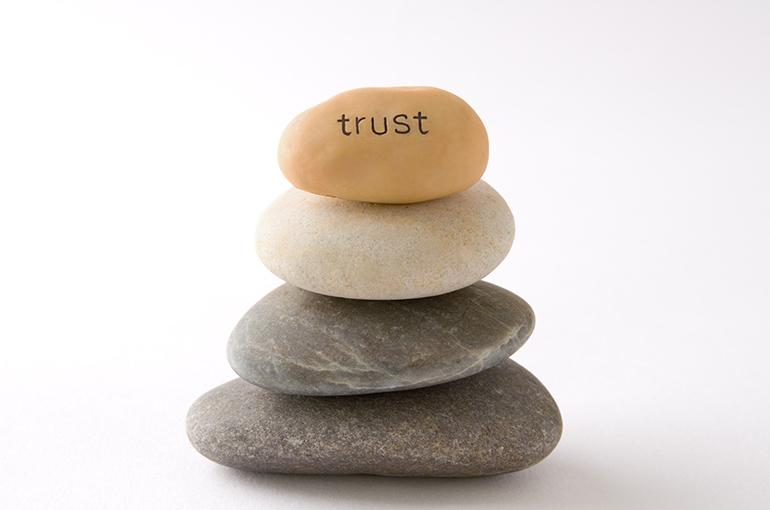 Declining Trust, Deep Polarization and the Risk of Internal Conflict
Declining Trust, Deep Polarization and the Risk of Internal Conflict(Yicai) Sept. 5 -- Ray Dalio, the founder of , presents a compelling argument in a recent . He contends that the ongoing declines in truth, trust and adherence to the rule of law could potentially pave the way for civil disorder in the US — a development the American public has yet to fully grasp.
Dalio’s book, : Why Nations Succeed and Fail, describes the hundred-year cycles that drive the ascent and decline of great nations. These cycles are the outcome of five forces: financial/economic, internal peace-conflict, external peace-conflict, nature and man’s inventiveness. Dalio’s article gives an up-to-date snapshot of how the internal peace-conflict cycle is currently playing out in the US.
“How people are with each other is the primary driver of the outcomes they get,” Dalio says to open the fifth chapter of his book in which he discusses how the internal cycle of order/disorder evolves. If people cannot agree on what is true and don’t trust the judgement of arbitrators, then this lack of social cohesiveness will undoubtedly lead to chaos.
Dalio asks his readers to consider not only their view of the impartiality of the American political system, its media and its courts but also the views of their neighbours. He, himself, is quite pessimistic and he cites polling data to illustrate just how low Americans’ trust in their institutions has fallen.
According to one poll, 40 to 50 percent of Americans strongly or moderately believe that the political decision-making system is not working fairly. Another, by , reports that only 42 percent of Americans believe their system of government is “basically sound.” One from notes that just 47 percent of Americans have "a great deal" or "a fair amount" of trust in the judicial system. This represents a 50-year low in the public’s assessment. However, Americans have even less trust in the media. A separate poll by shows that only 34 percent trusted the media “a great deal” or “a fair amount”. This is down from some 70 percent of respondents in the mid-1970s.
Dalio’s book describes the six stages of the internal order-disorder cycle (Figure 1). He believes the US is currently in Stage 5 in which bad financial conditions and intense internal conflicts potentially set the stage for a civil war or a revolution. Indeed, he currently puts the odds of a civil war in the US at just over 1 in 2.
Figure 1
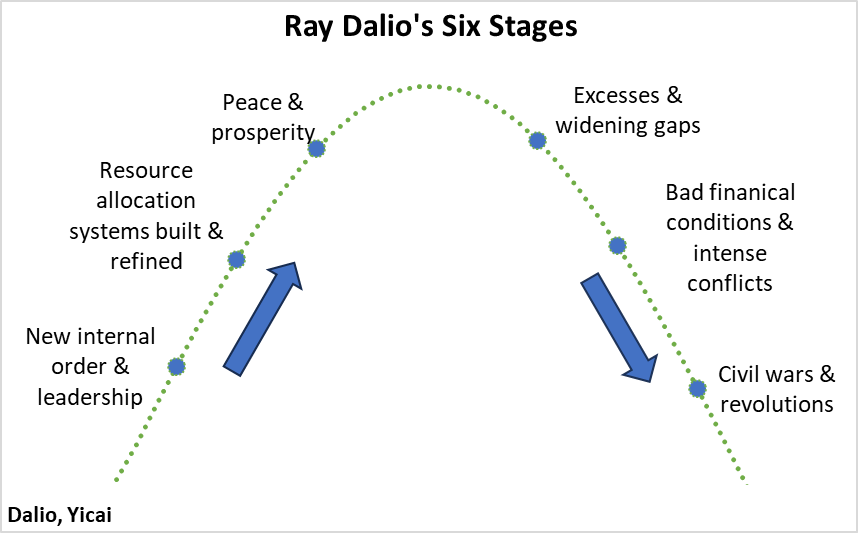
To prevent a period of “terrible chaotic fighting”, Dalio suggests that Americans need to be aware of the extent to which the social fabric has been frayed. They also need to hold themselves to high standards of conduct and “scream loudly” when these standards are violated. Finally, he proposes that people should comply with the legal system’s judgements, even if they see the system as biased and unfair.
Dalio’s vision is a stark one. To see if the problems he describes are uniquely American, I turned to the most recent survey conducted by the Edelman Trust Institute. Edelman has been conducting trust and credibility surveys for 23 years. The of the Edelman Trust Barometer is the result of more than 32,000 thirty-minute online interviews conducted in 28 countries between November 1st and November 28th, 2022.
Edelman’s flagship product is its Trust Index. Edelman asks survey participants if they trust non-governmental organizations (NGOs), business, government and media in their countries. For a given country, its score on the Trust Index is the average percentage of trust respondents express in the four domestic institutions.
To see how the Trust Index has evolved over time, I compared Edelman’s 2023 Barometer to its 2013 edition. The results for the 20 countries that appeared in both surveys are presented in Figure 2. The Trust Index for 2023 is read off of the vertical axis while 2013’s is plotted along the horizontal axis.
The data points for 15 of the 20 countries lie below the 45-degree line. This indicates that trust in these countries has fallen over the 10-year period. On average, trust declined by 3 percentage points, from 58 to 55. Bucking the trend, Indonesia posted a 13-point increase, by far the biggest in the group.
Particularly large declines (10 percentage points or more) were suffered by five countries: the US, Korea, Canada, Singapore and the UK. So, the Edelman data confirm Dalio’s insight that trust in the US has declined to relatively low levels (although it is not off of the charts compared to the rest of the sample).
China emerged in both surveys as the most trusting country. Its Trust Index improved from 80 in 2013 to 83 in 2023. The strong result for 2023 is noteworthy given its public health restrictions, to limit the spread of Covid, that were still in place in November 2022.
Figure 2
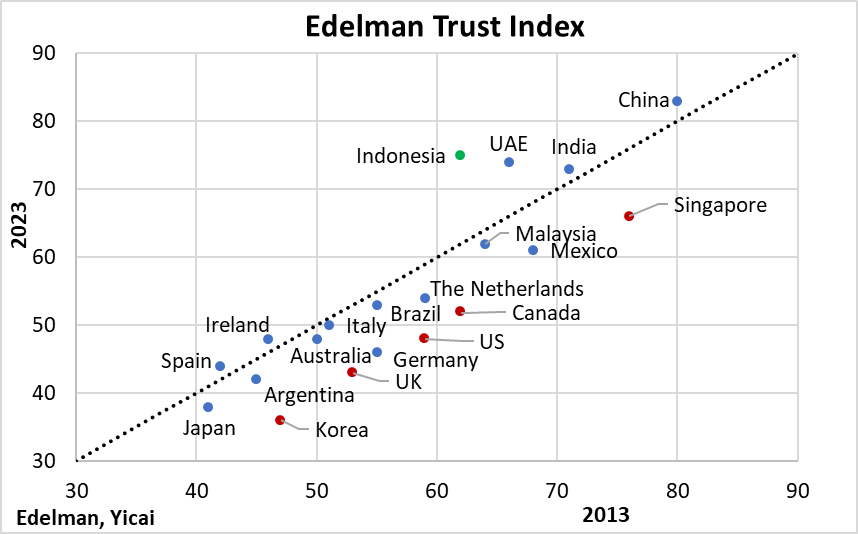
There is a stark difference in the levels of trust that Edelman finds in China and in the US (Figure 3).
Across all countries, the most trusted of the four domestic institutions was business (62 percent in the most recent survey). In China, 83 percent of the respondents trusted business, the highest in the sample. In the US it was only 55 percent. Trust in NGOs was 59 percent across all countries, with China scoring 78 percent (the highest). The US scored 50 percent. Trust in government was 50 percent across all countries, with China, again, having the highest score (89 percent) and the US coming in at 42 percent. Similarly, trust in media was 50 percent across all countries with China leading the group (79 percent) and the US coming in at 43 percent.
Figure 3
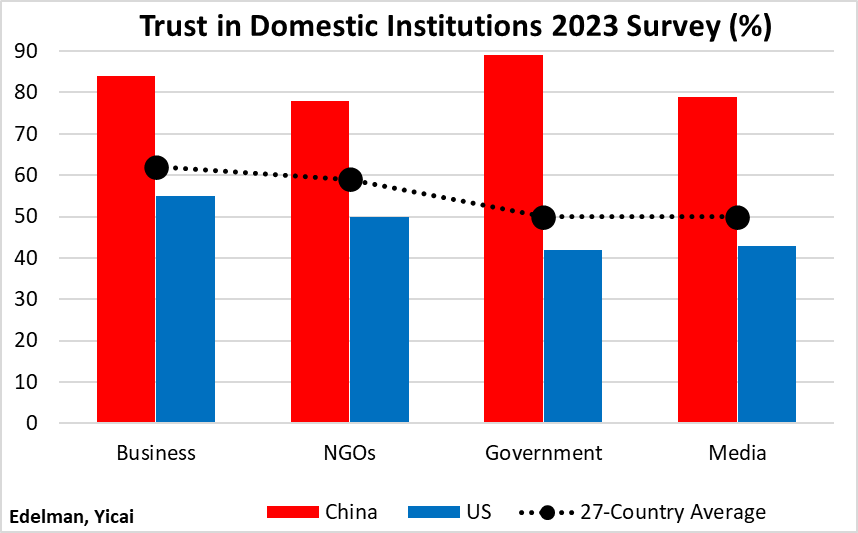
Not only do Chinese people believe in their domestic institutions, they have a high degree of trust in multilateral ones as well (Figure 4). Among the countries Edelman sampled, China had the highest levels of trust in the United Nations and the European Union. Trust in the World Health Organization was highest in India (85 percent), but China was not far behind, ranking fourth (at 83 percent).
In contrast, trust in multilateral institutions was fairly low in the US. For all three of the institutions shown in Figure 4, trust in the US was the fourth lowest among the 27 countries surveyed.
Figure 4
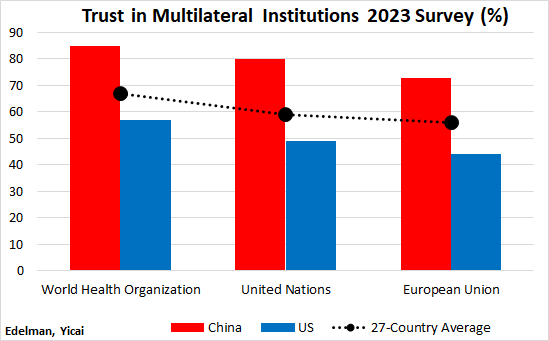
It is hard to explain why the Chinese people are so trusting.
One is tempted to attribute this to China’s long history of Confucianism, which stresses meritocracy and respect for the social order. However, Korea and Japan, which also have deep Confucian traditions, placed last and second to last on Edelman’s 2023 Trust Index.
Perhaps the answer lies in the success of the Chinese economy. Even though its GDP growth has slowed, it remains among the world’s most rapid. And Chinese people are relatively optimistic about their future prospects.
In its 2023 Barometer, Edelman reported that economic optimism had “collapsed”. The percentage of respondents saying that they and their families would be better off in five years dropped to 40 percent from 50 percent in the 2022 Barometer. In fact, economic optimism dropped to an all-time low in 24 of the 28 countries surveyed (Figure 5).
Emerging market countries were the most optimistic. In no advanced economy did the share of respondents expecting that they and their families would be better off in five years exceed 36 percent.
In China, where economic optimism was the fifth highest, 65 percent of respondents thought they would be better off five years from now, up one percentage point from the 2022 survey. China was the only country to post an increase in optimism.
Figure 5
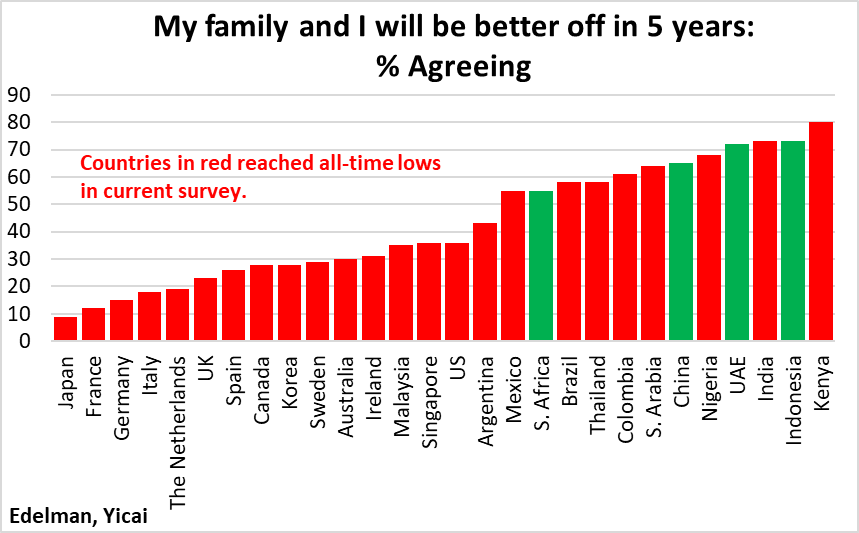
Edelman provides an interesting analysis of how polarized countries have become. It measures polarization by asking survey participants how divided their country is on key issues. Each country’s share of respondents that said their country was “very” or “extremely divided” is plotted in Figure 6. Consistent with Dalio’s analysis, the US is the third most polarized country in the sample. China is the second least polarized.
Figure 6
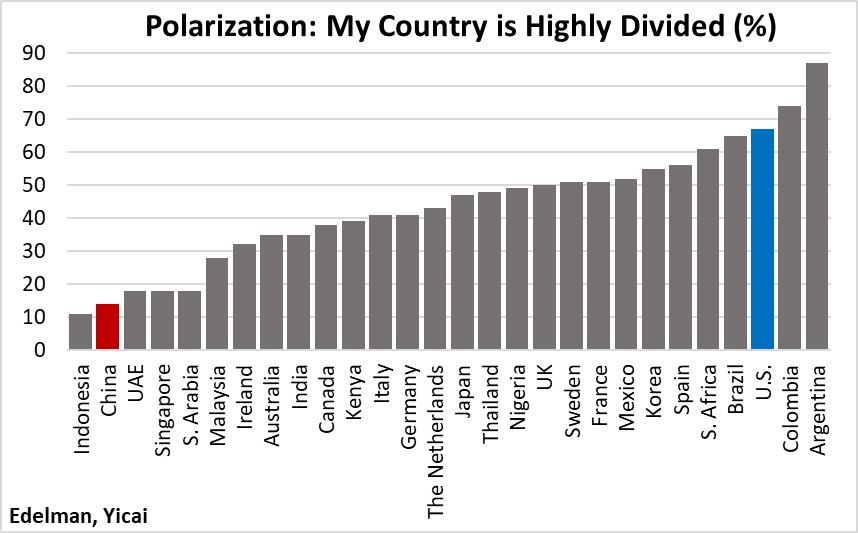
What causes countries to be polarized?
Edelman conducted an econometric analysis of polarization and found that it could be explained by six factors, all of which are proxied by specific survey questions it asked. In order of importance, they are: distrust of government, lack of a shared identity, systemic unfairness, economic pessimism, societal fears and distrust of media.
Edelman says that one of the legacies of the pandemic has been a loss of faith in the media and the rise of disinformation. It finds that in democracies, fewer than 40 percent of respondents believe the media to be honest and fair. Globally, nearly two-thirds of respondents report an unprecedented lack of civility and mutual respect in their countries.
In stage 5 of Dalio’s internal order/disorder cycle, the gaps between the rich and the poor are large and a majority of people are extremists who will fight to win at all costs. Thus, the lack of a common sense of truth, the decline in mutual trust and a deterioration in the perceived fairness of the legal system increase a country’s fragility. They make it more prone to civil disorder in the face of negative shocks. Edelman’s polarization data shows that while the situation in the US is acute, it is not alone in facing this serious challenge. On the other hand, low polarization in countries like Indonesia and China gives them a certain amount of resilience in these uncertain times.